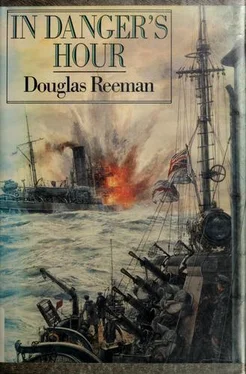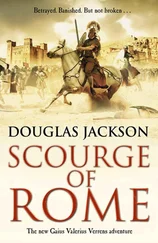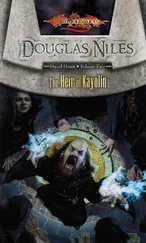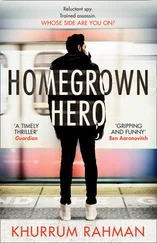Douglas Reeman - In Danger's Hour
Здесь есть возможность читать онлайн «Douglas Reeman - In Danger's Hour» весь текст электронной книги совершенно бесплатно (целиком полную версию без сокращений). В некоторых случаях можно слушать аудио, скачать через торрент в формате fb2 и присутствует краткое содержание. Город: London, Год выпуска: 1988, ISBN: 1988, Издательство: Putnam Adult, Жанр: prose_military, Морские приключения, на английском языке. Описание произведения, (предисловие) а так же отзывы посетителей доступны на портале библиотеки ЛибКат.
- Название:In Danger's Hour
- Автор:
- Издательство:Putnam Adult
- Жанр:
- Год:1988
- Город:London
- ISBN:9780399133886
- Рейтинг книги:5 / 5. Голосов: 1
-
Избранное:Добавить в избранное
- Отзывы:
-
Ваша оценка:
- 100
- 1
- 2
- 3
- 4
- 5
In Danger's Hour: краткое содержание, описание и аннотация
Предлагаем к чтению аннотацию, описание, краткое содержание или предисловие (зависит от того, что написал сам автор книги «In Danger's Hour»). Если вы не нашли необходимую информацию о книге — напишите в комментариях, мы постараемся отыскать её.
Battlecruiser
Iron Pirate
Horizon
White Guns
Sunset
In Danger's Hour — читать онлайн бесплатно полную книгу (весь текст) целиком
Ниже представлен текст книги, разбитый по страницам. Система сохранения места последней прочитанной страницы, позволяет с удобством читать онлайн бесплатно книгу «In Danger's Hour», без необходимости каждый раз заново искать на чём Вы остановились. Поставьте закладку, и сможете в любой момент перейти на страницу, на которой закончили чтение.
Интервал:
Закладка:
Moncrieff had remarked on one occasion, ‘No matter, Ian, they’ve got the edge on the rest of us.’
Ransome knew what he meant. Like all the servicemen who had left their countries in the face of German invasion, they wanted only to fight, to free their homelands, and rejoin those they loved.
It was hard to imagine how it must feel, to know that a wife or family was in occupied Europe or Scandinavia. If news of their work alongside the Allies reached the Gestapo there was little doubt of what might happen. The bang on the door before dawn. Humiliation, agony, oblivion.
The flotilla even found time to work with the army, covering landing craffcin a mock invasion along the Welsh coast, repeating signals for a mythical bombarding squadron.
As Beckett had complained, ‘Gets more like a bleedin’ circus every day!’
Then, when even Moncrieff was apparently satisfied, the flotilla returned to Falmouth.
Ransome had written a letter to Eve Warwick, but either there had been no time for her to reply or she had had second thoughts. In Falmouth, he decided to telephone her at the number shown on her letter. He presumed it was a vicarage, and waited, rehearsing like a teenage midshipman, planning his exact words should Eve’s mother or father pick up the telephone.
In fact, he was unable to make any contact. He thought again of the air-raids, and called the switchboard supervisor.
She had said wearily, ‘The telephone at that number is out of action.’ When he had persisted she had snapped, ‘There is a war on, you know, sir!’
Curiously, it had been Moncrieff who had unknowingly presented a solution.
‘I’ve been summoned to the C-in-C’s office at Plymouth, Ian.’ He had attempted to conceal his rising excitement. ‘Bit of a flap on apparently. I was asked today about our readiness to sail. 1 told them, God help any of my skippers who isn’t!’
So the rumour was gaining even more substance. Moncrieff added, ‘The real thing this time. I want you to come with me. As my half-leader you might find the trip useful. You’re used to the blood-and-guts of war; down in the command bunkers they see all that as mere statistics.’
Ransome had left Hargrave in charge. He had not warned him about responsibility again. If he had not learned his lesson, he never would now.
Hargrave had asked politely, ‘Is something on, sir?’
‘Yes, Number One. I can’t tell you yet, but if you’ve any mail outstanding I suggest you take some time to deal with it.’
Perhaps Hargrave already knew; maybe his father had told him?
Moncrieff had been provided with a staff car and Wren driver for the trip, and as they roared through narrow lanes then on to the main road to St Austell, Ransome was conscious of the closeness of the home where he had spent just six days of his leave.
Moncrieff must have read his thoughts. ‘I shall be a couple of days at least with Staff Officer Intelligence, Ian. You could take some time off. It might be a long while before you can again.’
Ransome had experienced something like guilt. I might never come back at all. He knew that he could not leave this time without at least trying to see the girl. But he said, ‘I might take you up on that, sir.’ It only made him feel more guilty.
Moncrieff slept for most of the journey, waking suddenly as the car pulled into a roadside inn where he had arranged for them to take lunch. The Wren driver declined the invitation to join them and Moncrieff said, ‘Pretty little thing.’
Ransome thought he had never looked so wistful.
They reached Plymouth in time for tea, and while Moncrieff went off to make his number with the staff officer on duty, Ransome took advantage of his freedom to begin his search.
As he made his way through the city he was appalled by the extent of the damage. Great areas of buildings wiped out, streets marked only by their chipped kerbstones and pavements, the rest a blackened desert where people had once been born, gone to school and learned to fend for themsleves.
An air-raid warden directed him to Codrington House, the address she had given, and had assured him that it had missed the bombing. So far. Ransome had asked him why he should be so certain that one particular building amongst so many had survived.
The man had regarded him curiously. ‘Well, it’s a sort of halfway-house – like a hospital, isn’t it?’
A taxi eventually took him there. It must have been quite beautiful in its day, with a long, gravelled drive curving amongst fine oaks to a pillared entrance, and a fountain around which cars, and at one time, carriages made their entrances and exits.
Now the grass was untended and the walls flaking, while the fountain was still filled with dead leaves. The once-impressive entrance was almost hidden by sandbagged barriers.
A woman of severe appearance in a grey costume watched him enter and asked, ‘May I help?’ It sounded like what do you want?
Ransome was at a loss. ‘I understood that the Warwick family lived—’
She changed instantly, removing the mask and replacing it with welcome. ‘Oh, Canon Warwick? Of course! Is he expecting you?’
‘Well, no—’ Ransome glanced round as three women in dressing-gowns accompanied by a tired-looking nurse crossed the great hallway. ‘What is this place?’
She studied him, her eyes moving from his single medal ribbon to the rank on his sleeves. He looked far too young for both, she thought.
‘Canon Warwick has an official role here as well as his religious duties.’ She waved her hand as the little procession vanished into another door. ‘Evacuee children, bombed-out families, people who have lost everything and everyone—’ She shrugged. ‘I don’t know what we would do without him.’
‘If I could leave a message—’
‘Nonsense.’ She picked up a telephone. ‘He’s in the building. What name is it, please?’
The girl spoke from the entrance doors. ‘It’s Lieutenant Commander Ransome, Mrs Collins.’
Ransome swung round and stared at her. How long she had been there he did not know. Like those times in the boatyard. Watching. Listening to his words.
She did not move as he strode toward her, and only when he put his arms around her shoulders did she show any emotion.
‘I can’t believe it. Your letter. Now you.’
He kissed her on the cheek, conscious of her warmth, the touch of her hair against his face. Like that other impetuous kiss when he had seen her leave. For the last time.
He said, ‘Sorry about this, Eve. It was just a chance, so I took it.’
She slipped her hand through his arm and guided him towards the door again. The birds were still singing, and there was sunlight clinging to the treetops.
He wanted to look at her properly, but she held to his arm as if to prevent just that.
She said, ‘I’ve dreamed about this. I wanted to write.’ She shrugged. ‘I was a bit afraid, I think. But when I got your address I made up my mind. I sat with the paper in front of me for hours.’ She swung round and faced him, her hands in his. ‘I was frightened you might have changed. When you answered my letter I knew—’ She reached up and touched his hair. ‘You look wonderful.’ The slight catch in her voice gave away the lie.
He said, ‘I’ve thought about you so much. My little girl in shorts and pigtails.’
She smiled. ‘Not any more.’
Ransome studied her slowly. It was like a dream. Four years, and yet she was not so different. She wore a shirt and overall trousers, the latter daubed with dried paint.
She said, ‘If I’d only known—’ She ran her hands across her forehead to brush away some strands of hair. ‘I’m a mess!’ Then she laughed, with relief, or with joy, perhaps both.
Читать дальшеИнтервал:
Закладка:
Похожие книги на «In Danger's Hour»
Представляем Вашему вниманию похожие книги на «In Danger's Hour» списком для выбора. Мы отобрали схожую по названию и смыслу литературу в надежде предоставить читателям больше вариантов отыскать новые, интересные, ещё непрочитанные произведения.
Обсуждение, отзывы о книге «In Danger's Hour» и просто собственные мнения читателей. Оставьте ваши комментарии, напишите, что Вы думаете о произведении, его смысле или главных героях. Укажите что конкретно понравилось, а что нет, и почему Вы так считаете.












